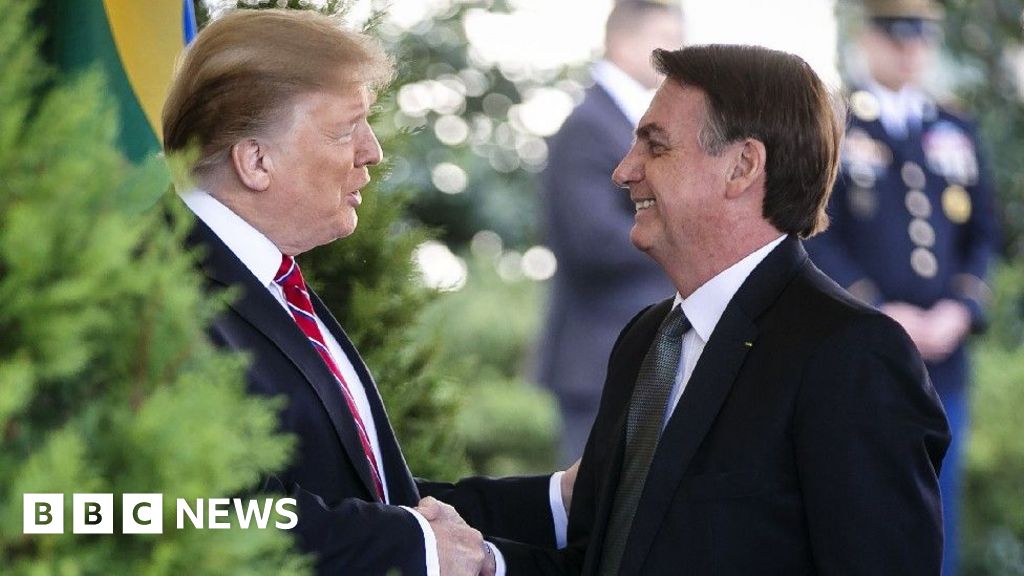
A message from US President Donald Trump on Wednesday landed like a grenade in Brazil, threatening to impose tariffs as high as 50% on the South American nation. Trump accused Brazil of “attacks” on US tech companies and conducting a “witch hunt” against Jair Bolsonaro, Brazil’s former far-right president and Trump’s ally. This bold move has plunged the already tense US-Brazil relations to an unprecedented low.
The announcement comes amidst a fresh round of political sparring between Trump and Brazil’s current president, Luiz Inácio Lula da Silva. Trump’s tariff threats are part of a broader strategy targeting the BRICS group, which includes Brazil, India, Russia, China, and now Iran, aiming to counterbalance US global influence.
Defending an Old Ally
Brazil’s trade relationship with the US is notable, as it imports more from the US than it exports. This setup aligns with Trump’s trade agenda, making the tariff threat appear as a gesture of support for Bolsonaro. Trump’s letter criticized the Brazilian government and Bolsonaro’s ongoing trial concerning an alleged coup attempt following the 2022 election.
Bolsonaro’s supporters have long sought Trump’s backing, especially as Bolsonaro faces legal challenges. His son, Eduardo Bolsonaro, has been active in the US, seeking support from Trump’s inner circle. Trump’s letter accused the Brazilian government of “insidious attacks on Free Elections,” highlighting the ongoing investigation into disinformation in Brazil, which has seen social media accounts linked to Bolsonaro’s supporters blocked by the Supreme Court.
Political and Economic Repercussions
The potential tariffs have left Brazilian authorities and businesses scrambling to assess the economic impact. Politically, Trump’s words are a strong endorsement for Bolsonaro, who aspires to run for president again despite being banned until 2030. Bolsonaro’s allies, like São Paulo Governor Tarcísio de Freitas, blame Lula for prioritizing ideology over economics, suggesting the tariffs are a result of his policies.
However, some analysts warn that Trump’s support might backfire. The US is Brazil’s second-largest trade partner, and sectors aligned with Bolsonaro, such as agribusiness, could suffer from the tariffs. Concerns are rising about the impact on Brazilian exports like oranges, coffee, and beef.
Potential Lifeline for Lula
Meanwhile, Trump’s tariff threat could unexpectedly benefit Lula, who is grappling with declining popularity and legislative challenges. A poll from May indicated that 55% of Brazilians disapprove of Trump, and the tariffs are unlikely to change that sentiment. Lula and the Brazilian left have responded by emphasizing national sovereignty and blaming Bolsonaro for the potential economic fallout.
Centrist politicians have also reacted negatively to Trump’s threats. Alessandro Vieira, a centrist senator, emphasized the need for patriotism in the face of foreign aggression. This situation could rally support for Lula, presenting him as a defender of national sovereignty.
Expert Opinions and Historical Parallels
Oliver Stuenkel, a professor at the Getúlio Vargas Foundation, suggests that Trump’s move might generate a “rally-around-the-flag” effect for Lula, as even his critics may view it as an attack on Brazil’s sovereignty and judicial independence. This situation mirrors past instances where foreign pressure has united domestic political factions.
“Even Lula’s critics may see Trump’s move as an attack on national sovereignty and the independence of the judiciary,” said Oliver Stuenkel.
Implications and Future Prospects
The unfolding tariff saga between the US and Brazil highlights the complexities of international politics and trade. As both nations navigate this diplomatic challenge, the economic and political consequences remain uncertain. The situation underscores the intricate balance between domestic politics and international relations.
Looking ahead, the potential for escalation looms, with Brazil contemplating reciprocal tariffs on American products. The global community will be watching closely to see how this geopolitical chess game plays out, and whether it will lead to a recalibration of alliances and trade dynamics.







